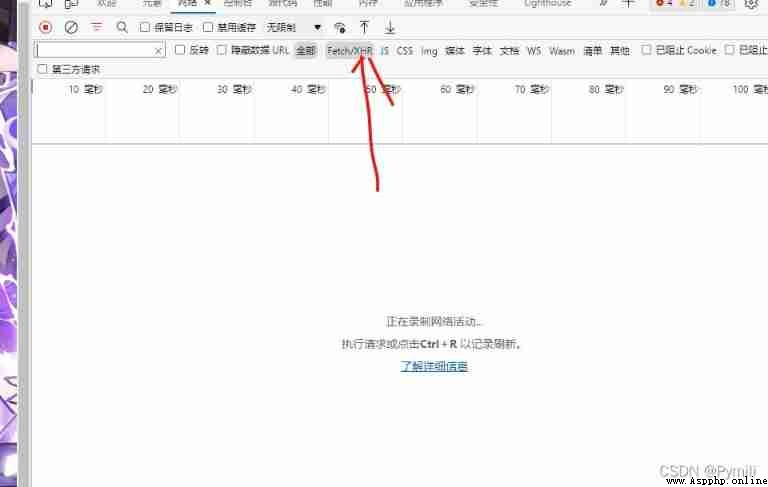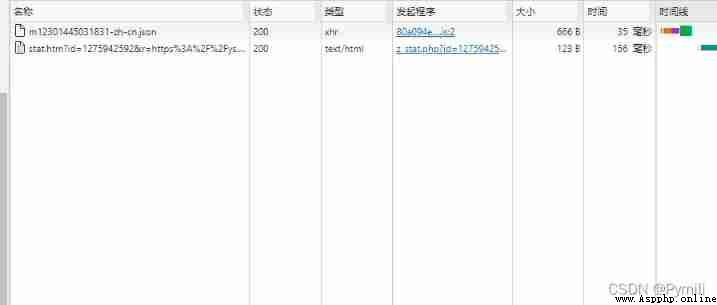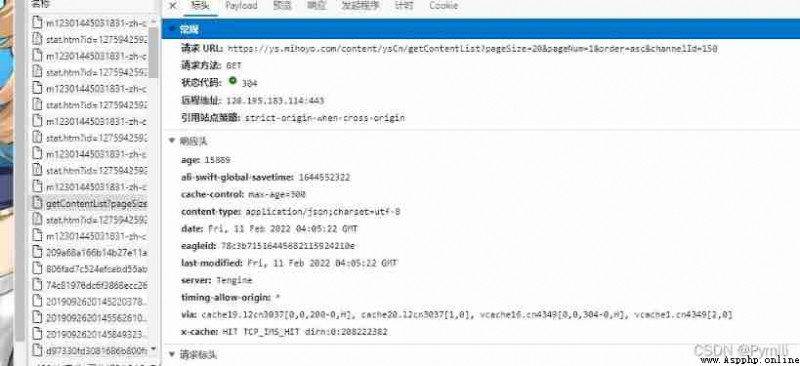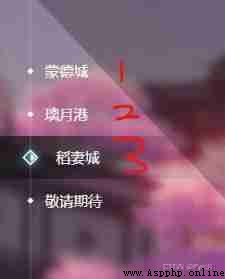Catalog
1. Web analytics capture
2. Code writing
Use Python The role query function of production It has been made Nonebot2 plug-in unit , You can get the plug-in package in my group .
1. Web analytics capture
For this kind of Dynamic web pages We go to crawl the web html Code can't get complete data , But you can't use it if you want to make it into a robot plug-in selenium, You can view the requested address api Find the data

choice xhr Look for documents api
As shown in the figure above, when I click another role , I found a request xhr file

So we can find it with a few more clicks api file

That's the data we need , Inside is the return json Data we can directly crawl these data . I saw it on the web interface 3 Different request addresses in different cities , So we have to climb 3 individual xhr request .

2. Code writing
Basic data ,3 Different links
import requests
from bs4 import BeautifulSoup as be
md_url="https://ys.mihoyo.com/content/ysCn/getContentList?pageSize=20&pageNum=1&order=asc&channelId=150" # Monde
ly_url="https://ys.mihoyo.com/content/ysCn/getContentList?pageSize=20&pageNum=1&order=asc&channelId=151" # Away from the moon
dq_url="https://ys.mihoyo.com/content/ysCn/getContentList?pageSize=20&pageNum=1&order=asc&channelId=324" # Rice wife
Write a function directly to get each api Of json data
def get_json(_url_):
req=requests.get(url=_url_)
if req.status_code == 200:
return req.json()['data']
else:
return NoneThen it is to clean the data , Throw away unused data , Just leave what is useful and what is usable
def clean_data(_data_):
_return_=[]
for key in _data_['list']:
ext=key["ext"]
data={key['title']:{
" role ICON":ext[0]["value"][0]["url"],
" Computer end draw ":ext[1]["value"][0]["url"],
" Mobile phone end painting ":ext[15]["value"][0]["url"],
" Character name ":key['title'],
" Character attributes ":ext[3]["value"][0]["url"],
" Role language ":ext[4]["value"],
" Sound quality 1":ext[5]["value"],
" Sound quality 2":ext[6]["value"],
" brief introduction ":be(ext[7]["value"],"lxml").p.text.strip(),
" Lines ":ext[8]["value"][0]["url"],
" Audio ":{
ext[9]["value"][0]["name"]:ext[9]["value"][0]["url"],
ext[10]["value"][0]["name"]:ext[10]["value"][0]["url"],
ext[11]["value"][0]["name"]:ext[11]["value"][0]["url"],
ext[12]["value"][0]["name"]:ext[12]["value"][0]["url"],
ext[13]["value"][0]["name"]:ext[13]["value"][0]["url"],
ext[14]["value"][0]["name"]:ext[14]["value"][0]["url"],
},
}
}
_return_.append(data[key['title']])
return _return_Later, we will do a function to find the role information, so we need to save the data first ,data[ Character name ]={ Character data }
def data():
_json_={}
for url in [md_url,ly_url,dq_url]:
jsonlist=clean_data(get_json(url))
for json in jsonlist:
_json_[json[' Character name ']]=json
return _json_So we can start from data Function to get the sorted data
Our last step is to find the function
def lookup(name):
json = data()[name]
print(" Find the character :",name)
for key,value in json.items():
if key == " Audio ":
for keys,values in json[key].items():
print(f"{keys}{values}")
else:
print(f"{key}:{value}")
# Usage method lookup(' Character name ')Let's see the effect :

In this way, our crawler will write , Here is the complete code :
import requests
from bs4 import BeautifulSoup as be
md_url="https://ys.mihoyo.com/content/ysCn/getContentList?pageSize=20&pageNum=1&order=asc&channelId=150"
ly_url="https://ys.mihoyo.com/content/ysCn/getContentList?pageSize=20&pageNum=1&order=asc&channelId=151"
dq_url="https://ys.mihoyo.com/content/ysCn/getContentList?pageSize=20&pageNum=1&order=asc&channelId=324"
def get_json(_url_):
req=requests.get(url=_url_)
if req.status_code == 200:
return req.json()['data']
else:
return None
def clean_data(_data_):
_return_=[]
for key in _data_['list']:
ext=key["ext"]
data={key['title']:{
" role ICON":ext[0]["value"][0]["url"],
" Computer end draw ":ext[1]["value"][0]["url"],
" Mobile phone end painting ":ext[15]["value"][0]["url"],
" Character name ":key['title'],
" Character attributes ":ext[3]["value"][0]["url"],
" Role language ":ext[4]["value"],
" Sound quality 1":ext[5]["value"],
" Sound quality 2":ext[6]["value"],
" brief introduction ":be(ext[7]["value"],"lxml").p.text.strip(),
" Lines ":ext[8]["value"][0]["url"],
" Audio ":{
ext[9]["value"][0]["name"]:ext[9]["value"][0]["url"],
ext[10]["value"][0]["name"]:ext[10]["value"][0]["url"],
ext[11]["value"][0]["name"]:ext[11]["value"][0]["url"],
ext[12]["value"][0]["name"]:ext[12]["value"][0]["url"],
ext[13]["value"][0]["name"]:ext[13]["value"][0]["url"],
ext[14]["value"][0]["name"]:ext[14]["value"][0]["url"],
},
}
}
_return_.append(data[key['title']])
return _return_
def data():
_json_={}
for url in [md_url,ly_url,dq_url]:
jsonlist=clean_data(get_json(url))
for json in jsonlist:
_json_[json[' Character name ']]=json
return _json_
def lookup(name):
json = data()[name]
print(" Find the character :",name)
for key,value in json.items():
if key == " Audio ":
for keys,values in json[key].items():
print(f"{keys}:{values}")
else:
print(f"{key}:{value}")
This function has been made into my robot plug-in , You can come to the Group :706128290 To discuss , Download the plug-in package .
I am a PYmili, See you next time !